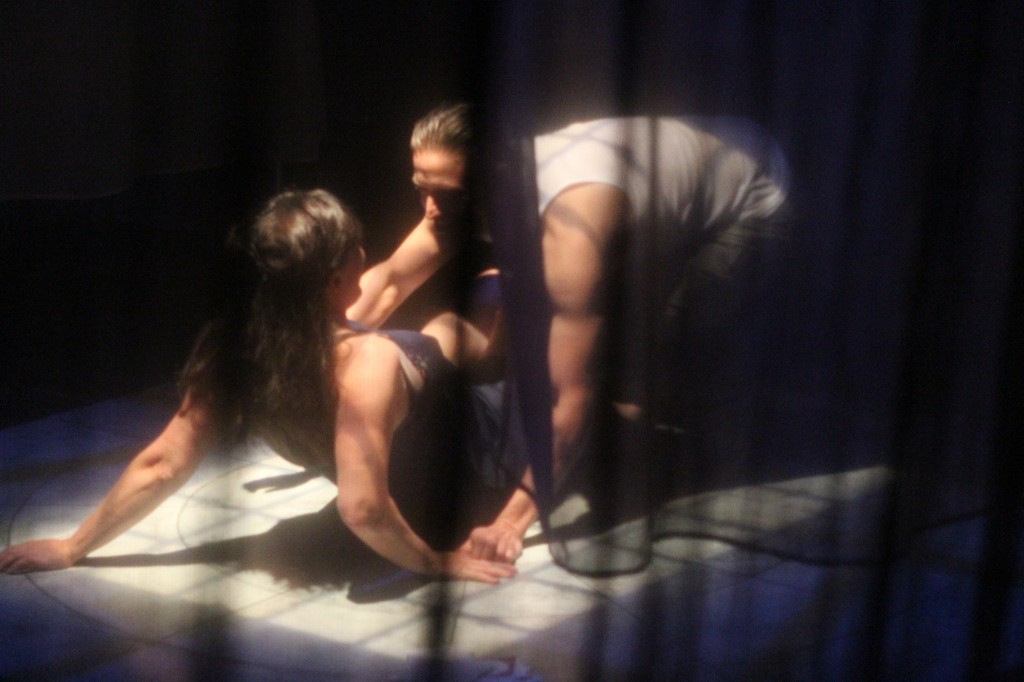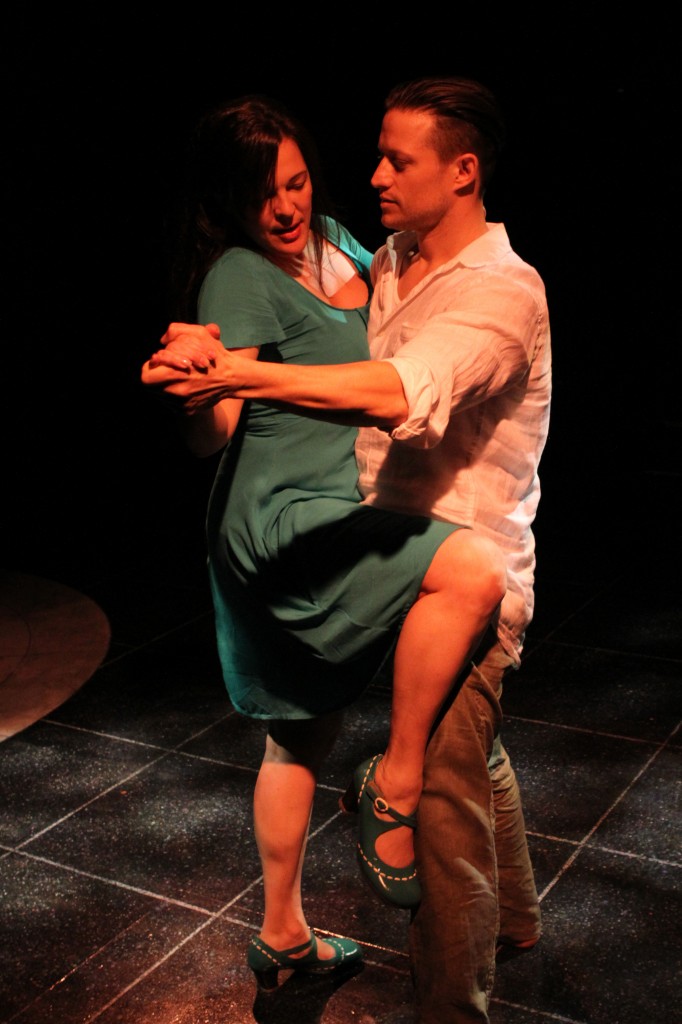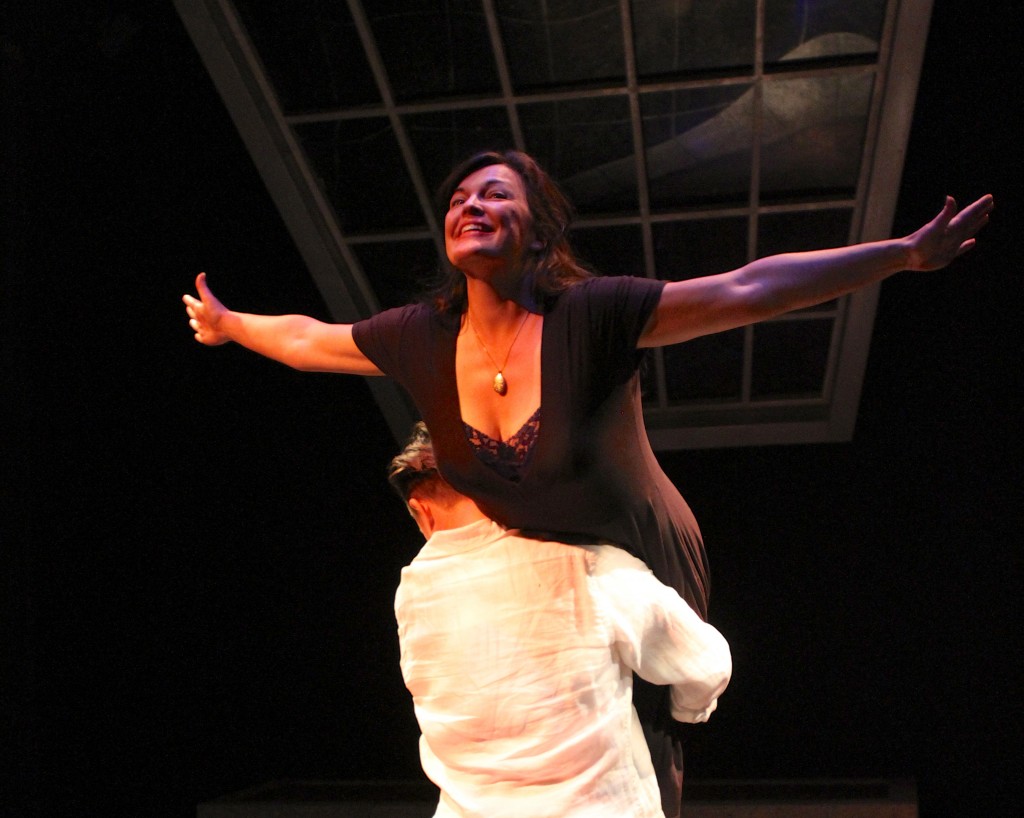
Credit: Ron Reed
At Pacific Theatre until June 14
604-731-5518/pacifictheatre.org
Posted May 24, 2014
If, after seeing Lucia Frangione’s Espresso, you don’t feel like rushing home, whipping up some Calamari Piccanti Calabresi, washing it down with a sassy Italian white wine and afterwards, indulging in some amore right there on the kitchen table amidst the litter of plates and glasses, you probably need a spring tonic. And, oh, how you’ll wish you were born Italian. Blend the Songs of Solomon (“Let him kiss me with the kisses of his mouth: for thy love is better than wine”) and Frangione’s lushly romantic dialogue and what you’ve got is torrido.
I saw the premiere of Espresso back in 2003 and although I was swept up in the sensuality of the script and production, I didn’t really ‘get’ it. In the play, Frangione explores her love/hate relationship with her father and her Heavenly Father. Not a Catholic and with no relationship with any god, I was then – and remain – somewhat bewildered by Frangione’s erotic fantasies about the Holy Spirit – represented here, in Espresso, as a male character called Amante (‘lover’). It’s the point where Catholicism meets Eros; a place I’ve never been and can’t quite imagine. But under Sarah Rodgers direction this time around, I came much closer to understanding what Frangione is getting at. And the play is undeniably lush, luscious, lovely – as is Frangione herself.

Credit: Ron Reed
Rosa (played by the playwright) has flown across Canada to the hospital bedside of her father Vito who fell asleep at the wheel, ran into a pole and is critically wounded. The whole Dolores family is there and we meet them all briefly (and all played by the astonishingly transformative Robert Salvador). The central characters are three women: Rosa, 33, single, half-Italian on her father’s side; her paternal grandmother, Nonna; and Vito’s second wife, Cinzella, a fox-fur wearing, tough-talking woman who has put up with Vito’s philandering for years. Sometimes Vito was having it off with skinny women about whom Cinzella pronounces, “Everyone happy is just a little bit fat.”
Rosa and Cinzella have a conflicted relationship with Vito; Nonna, his mother, loves him unconditionally and thinks no woman is good enough for him. “That bitch,” is how she refers to Cinzella. Rosa loves him but believes her father prefers Tony, a man to whom she was once engaged. Cinzella loves him but his infidelity is hard on her.
Amante, a fantasy character, appears to all three women: to Rosa who, because of her father’s domineering patriarchy and unfaithfulness, cannot commit to a relationship; Nonna, who has never experienced sexual pleasure; and Cinzella who, for all her bravado, would love to be faithfully loved. They do, in their way, all love Vito.
Frangione and Salvador play all the roles, male and female; sometimes they switch mid-sentence and sometimes Frangione speaks directly to us: “It’s gonna be a bit confusing but you’ll catch on”, she tells us when introducing us to her big Italian family. Or later when Rosa wonders whether she wants “a perfect man or a loving god”, Frangione asks us, “How fucked up is this?”
Stancil Campbell’s set is simple but very evocative: two large windows slant down over the performance area at a 45 degree angle and scrims surround the stage, distancing the action, at times, and moving us from the scene of the accident to the hospital and to Goldstream Park where Rosa experiences death and rebirth through the migration of salmon.
What I did, finally, get from Espresso this time was the comfort and joy that Catholicism can bring. While Rosa rails against Amante, in her deepest despair she is consoled and healed by him. Nonna, widowed and aged, unleashes herself with Amante and experiences her own sensuality; Cinzella finds in Amante love that is faithful and abiding. Each dances with Amante – once – and in those dances, there is healing.
Go for Frangione’s poetry that falls like ripe fruit from a tree. Go for the humour; there’s plenty of it. Go for the taste-bud teasing references to all that Italian food; it’s the next best thing to being in love and in Italy. And then go home and dance with whomever is there: your lover, your kids, your dog, your cat.

Credit: Ron Reed

